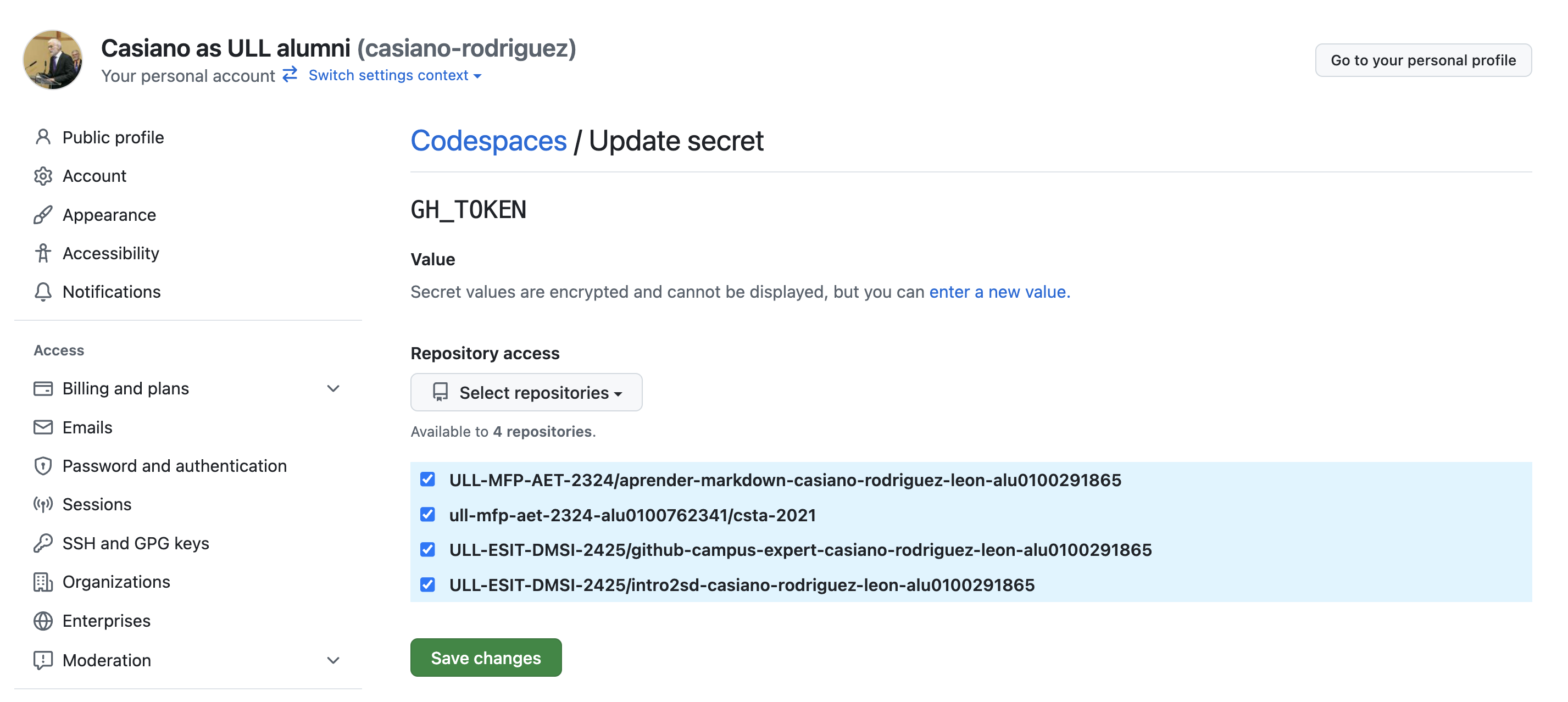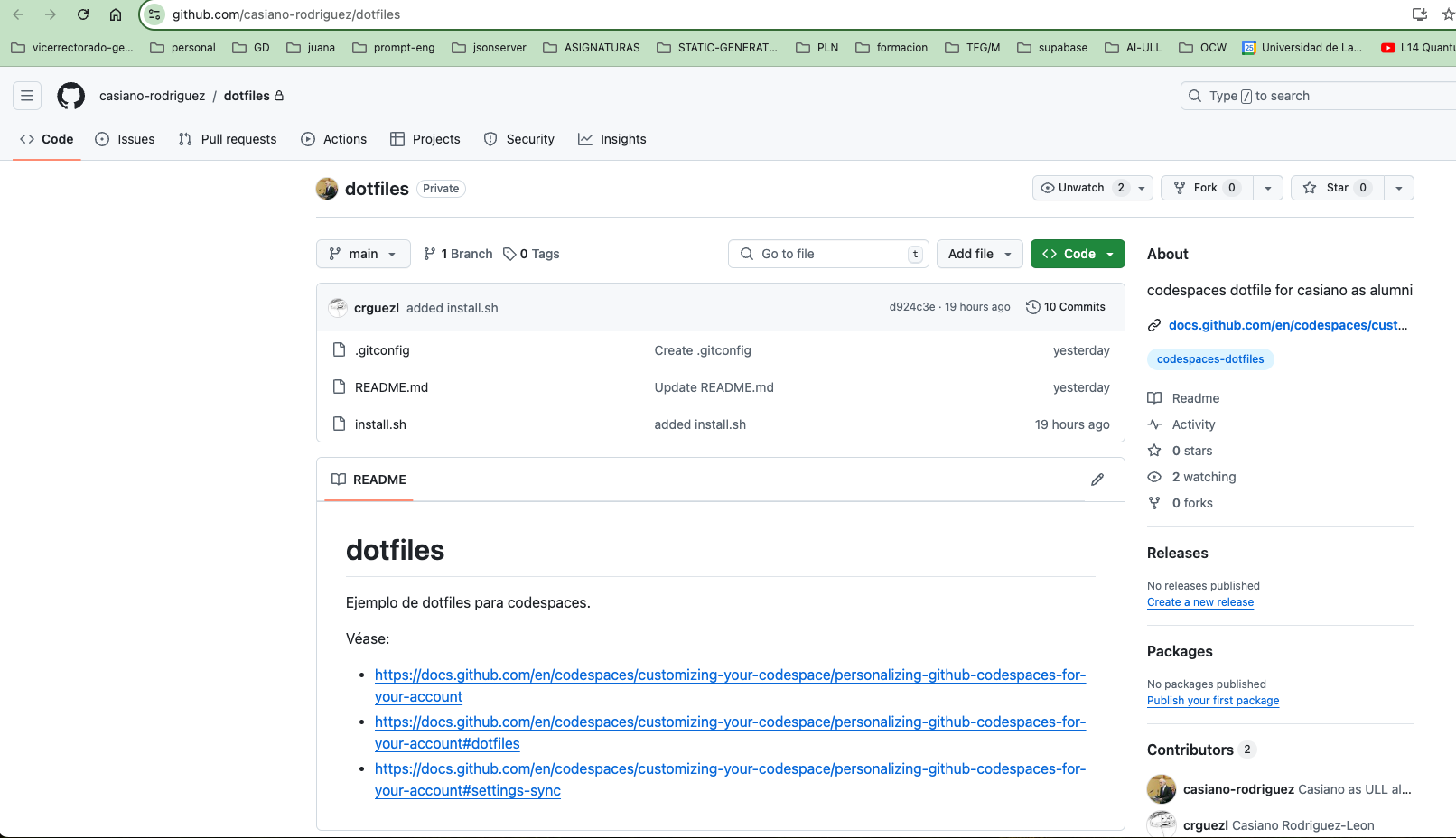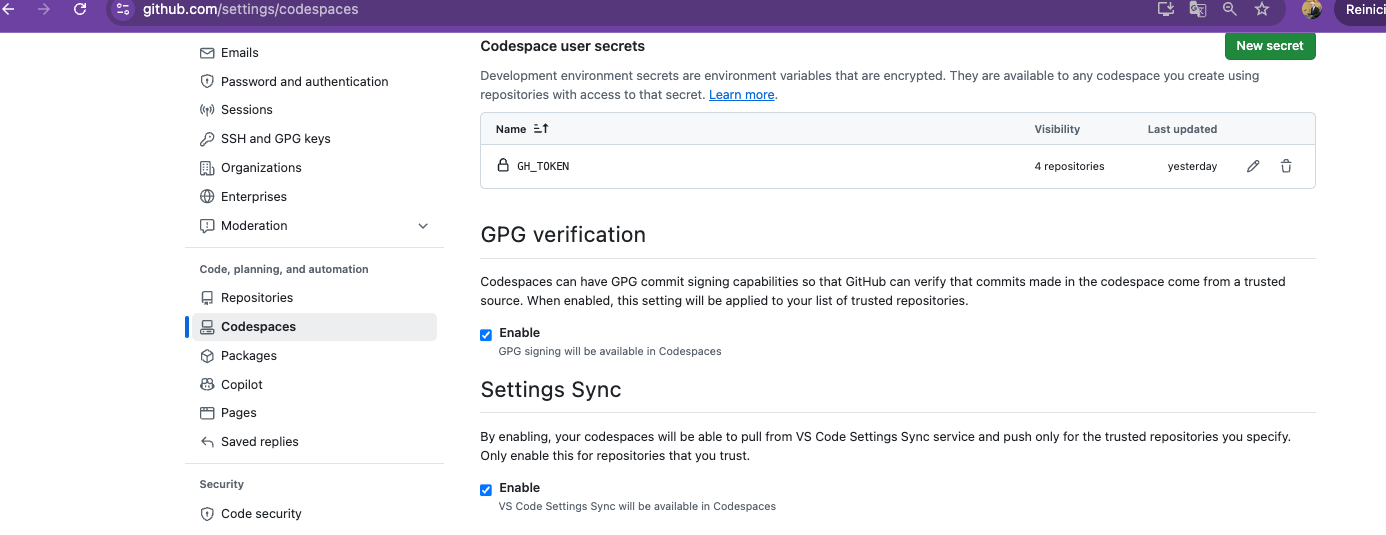Desarrollo y Mantenimiento de Sistemas Informáticos
4º. 1er cuatrimestre. Itinerario de Sistemas de la Información. Grado en Ingeniería Informática. ULL
GH Org - GH Template Org - GitHub Classroom - Discussions - Teams - Campus ULL - Students Activity - Chat - Google Meet
GitHub CodeSpaces
Introduction
GitHub Codespaces allows users to use a Visual Studio Code backed editor, terminal, and debugger along with GitHub version control in the browser or on a desktop.
Integrating Codespaces into your GitHub Classroom experience can provide a scalable solution for quickly getting CS students started using virtually any device including Chromebooks and iPads. If it’s got a browser, it’s now a development environment for your students.
Here is the documentation: GitHub Codespaces:
Personalizing your Codespace
Si quieres personalizar tu Codespace, puedes leer Personalizing GitHub Codespaces for your account.Puedes personalizar GitHub Codespaces usando
- Un repositorio
dotfilesen GitHub o - Usando Settings Sync.
To speed up codespace creation, you can configure your project to prebuild codespaces for specific branches in specific regions. You create and configure prebuilds in your repository’s settings.
- Repository-level settings for GitHub Codespaces are available for all repositories owned by personal accounts.
- For repositories owned by organizations, repository-level settings for GitHub Codespaces are available for organizations on GitHub Team plans that there is the one you get from GH Education as a teacher.
See the documentation at codespaces/prebuilding-your-codespaces.
A prebuild assembles the main components of a codespace for a particular combination of repository, branch, and devcontainer.json configuration file.
It provides a quick way to create a new codespace. For complex and/or large repositories in particular, you can create a new codespace more quickly by using a prebuild.
Whenever you push changes to your repository, GitHub Codespaces uses GitHub Actions to automatically update your prebuilds.
See codespaces-contrib/dotfiles, casiano-rodriguez/dotfiles and crguezl/dotfiles (the last two are private repos)
Exercise: Personalizing your Codespace
- Generate a token with admin power (go to https://github.com/settings/tokens). Give them superpowers and save it as
admintoken - Go to your Codespace user secrets section https://github.com/settings/codespaces and
- Add a
GH_TOKENsecret in the codespace repository settings. See https://cli.github.com/manual/gh_help_environment. -
As value use the token you generated in the previous step.

- Add a
- Activate the section Dotfiles.
- Create a
dotfilesrepository in your GitHub account.
- Copy what you want of your
.gitconfigand.bashrcfiles to thedotfilesrepository. -
Write a
install.shscript that installs your favorite tools. Example:gh alias set cd '!gh config set current-org "$1" 2>/dev/null' gh alias set pwd '!gh config get current-org' #gh extension install github/gh-classroom #gh extension install github/gh-copilot gh extension install gh-cli-for-education/gh-org-teams gh extension install crguezl/gh-org-clone #gh extension install crguezl/gh-submodule-add
- Put all you repos as Trusted repositories in the corresponding subsection of https://github.com/settings/codespaces.
- Activate the Settings Sync section.
- Enable GPG verification in your Codespace
Codespace Personalization: Troubleshooting
See the docs at Troubleshooting personalization options for GitHub Codespaces.
Check /workspaces/.codespaces/.persistedshare/dotfiles to see if your dotfiles were cloned.
-
If your
dotfileswere cloned, try manually re-running your install script to verify that it is executable. -
If your
dotfileswere not cloned, check/workspaces/.codespaces/.persistedshare/@casiano-rodriguez ➜ /workspaces $ ls -a .codespaces/.persistedshare/*.log .codespaces/.persistedshare/creation.log @casiano-rodriguez ➜ /workspaces $ ls -a .codespaces/.persistedshare/*.txt .codespaces/.persistedshare/vsserverhostlog.txt .codespaces/.persistedshare/vsserverterminallog.txtThe file
.codespaces/.persistedshare/vsserverterminallog.txtcontains the output of the terminal including escape codes.The file
.codespaces/.persistedshare/vsserverhostlog.txtcontains the output of the host. -
Check
/workspaces/.codespaces/.persistedshare/creation.logfor possible issues. For more information, see Creation logs.@casiano-rodriguez ➜ /workspaces $ cat .codespaces/.persistedshare/creation.logSee the output of the previous
cat .codespaces/.persistedshare/creation.logcommand
For instance, I notice that the .gitconfig file in the dotfiles repositoryis is in /workspaces/.codespaces/.persistedshare/dotfiles/.gitconfig
but hasn’t being copied to the home directory (/home/codespace).
So I manually link it:
ln -s /workspaces/.codespaces/.persistedshare/dotfiles/.gitconfig ~/
The codespaces shared folder
The shared folder is located at /root/.codespaces/shared/.
@casiano-rodriguez ➜ /workspaces/intro2sd-casiano-rodriguez-leon-alu0100291865 (main) $ ls -a ../.codespaces/shared
.environmentConfigurationCompleted
devContainerTelemetry.json
merged_devcontainer.json
unifiedPostCreateOutput.json
.user-secrets.json
editors // folder
postCreateOutput.json
user-secrets-envs.json
.env
codespaceStatusTool.js
environment-variables.json
read-config.json
.env-secrets
cs-agent.sock // a socket
first-run-notice.txt
resource-usage.json
It contains among others the user-secrets.json file:
➜ /workspaces/dotfiles (main) $ cat ../.codespaces/shared/.user-secrets.json | jq '.'
[
{
"type": "EnvironmentVariable",
"name": "GITHUB_SERVER_URL",
"value": "https://github.com"
},
{
"type": "EnvironmentVariable",
"name": "GITHUB_API_URL",
"value": "https://api.github.com"
},
{
"type": "EnvironmentVariable",
"name": "GITHUB_GRAPHQL_URL",
"value": "https://api.github.com/graphql"
},
...
{
"type": "EnvironmentVariable",
"name": "GITHUB_TOKEN",
"value": "ghu_XXXX...XXX"
},
...
{
"type": "EnvironmentVariable",
"name": "GITHUB_USER",
"value": "casiano-rodriguez"
},
...
{
"type": "EnvironmentVariable",
"name": "CODESPACES",
"value": "true"
},
{
"type": "EnvironmentVariable",
"name": "CODESPACE_NAME",
"value": "studious-potato-blah-blah"
}
]
THE GH_TOKEN secret does not appear in the user-secrets.json file.
